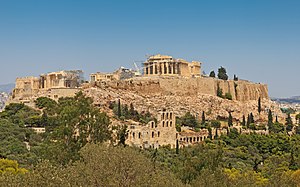
Back Polis (stad) Afrikaans Polis ALS بوليس (مدينة يونانية) Arabic بوليس (مدينه ضايعه فى اليونان القديمه) ARZ Polis AST Polis (antik) Azerbaijani Polis BAR Поліс (антычнасць) Byelorussian Полис Bulgarian Polis (Henc'hres) Breton
Ancient Greek Polis
πόλις | |
|---|---|
 Acropolis of Athens, a noted polis of classical Greece. The polis was the whole city, which had its own walls. Shown is a part of the polis, the akro-polis, "city heights," which was never alone regarded as its own city. The origins of the settlement are lost in prehistoric times. Also included in the classical Athenian polis were suburban locations in the region of Attica, such as the port, Piraeus. | |
| Etymology: "walls" | |
| Government | |
| • Type | Republic, or commonwealth. The ultimate authority was considered to reside in the citizenry, the demos, despite the broad variation in the form of the administration. |
| • Body | The assembly, or ekklesia, although in the more autocratic forms of administration, it met rarely. The day-to-day governing was performed by magistrates, called archons. |
| Area | |
| • max area of 60% of poleis | 100 km2 (40 sq mi) |
| • max area of 80% of poleis | 200 km2 (80 sq mi) |
| Population | |
| • Total | 7,500,000+ |
| Demonym(s) | Dēmos in the Attic-Ionic dialects or dãmos in the Doric. The demonym was formed by producing the name of a people from the name of the polis. For example, the polis of Athens was named Athenai after the goddess Athena; hence the demos was the Athenaioi, "the Athenians."[d] |
Polis (/ˈpɒlɪs/, US: /ˈpoʊlɪs/; Greek: πόλις, Greek pronunciation: [pólis]), plural poleis (/ˈpɒleɪz/, πόλεις, Greek pronunciation: [póleːs]), means ‘city’ in ancient Greek. The modern Greek word πόλη (polē) is a direct descendant of the ancient word and roughly means "city" or an urban place. However, the Ancient Greek term that specifically meant the totality of urban buildings and spaces was asty (ἄστυ), rather than polis.
The ancient word polis had socio-political connotations not possessed by the modern. For example, today's πόλη is located within a χώρα (khôra), "country," which is a πατρίδα (patrida) or "native land" for its citizens.[3] In ancient Greek, the polis is the native land; there is no other. It has a constitution and demands the supreme loyalty of its citizens. χώρα is only the countryside, not a country. Ancient Greece is not a sovereign country, but is a territory occupied by Hellenes, people who claimed as their native language some dialect of ancient Greek.
Poleis didn't only exist within the area of the modern Republic of Greece. A collaborative study carried by the Copenhagen Polis Centre from 1993 to 2003 classified about 1500 settlements of the Archaic and Classical ancient-Greek-speaking population as poleis. These ranged from the Caucasus to southern Spain, and from southern Russia to northern Egypt, spread over the shores of the Mediterranean and Black Seas.[4] They have been termed a network of micro-states. Many of the settlements still exist; e.g., Marseilles, Syracuse, Alexandria, but they are no longer Greek or micro-states, belonging to other countries.
The ancient Greek world was split between homeland regions and colonies. A colony was generally sent out by a single polis to relieve the population or some social crisis or seek out more advantageous country. It was called a metropolis or "mother city." The Greeks were careful to identify the homeland region and the metropolis of a colony. Typically a metropolis could count on the socio-economic and military support of its colonies, but not always. The homeland regions were located on the Greek mainland. Each gave an ethnic or "racial" name to its population and poleis. Acarnania, for example was the location of the Acarnanian people and poleis.[4] A colony from there would then be considered Acarnanian, no matter how far away from Acarnania it was. Colonization was thus the main method of spreading Greek poleis and culture.
Ancient Greeks did not reserve the term polis solely for Greek-speaking settlements. For example, Aristotle's study of the polis names also Carthage, comparing its constitution to that of Sparta. Carthage was a Phoenician-speaking city. Many nominally Greek colonies also included municipalities of non-Greek speakers, such as Syracuse.[e]
Cite error: There are <ref group=lower-alpha> tags or {{efn}} templates on this page, but the references will not show without a {{reflist|group=lower-alpha}} template or {{notelist}} template (see the help page).
- ^ Hansen 2004, pp. 70–72
- ^ Hansen 2008, pp. 261–265
- ^ The modern words can be found in any modern Greek dictionary; the ancient, any ancient Greek dictionary. Some instances are The Oxford Greek Dictionary, American Edition, for the modern, and Liddell and Scott's A Greek–English Lexicon for the ancient.
- ^ a b Hansen 2004, p. 4
© MMXXIII Rich X Search. We shall prevail. All rights reserved. Rich X Search